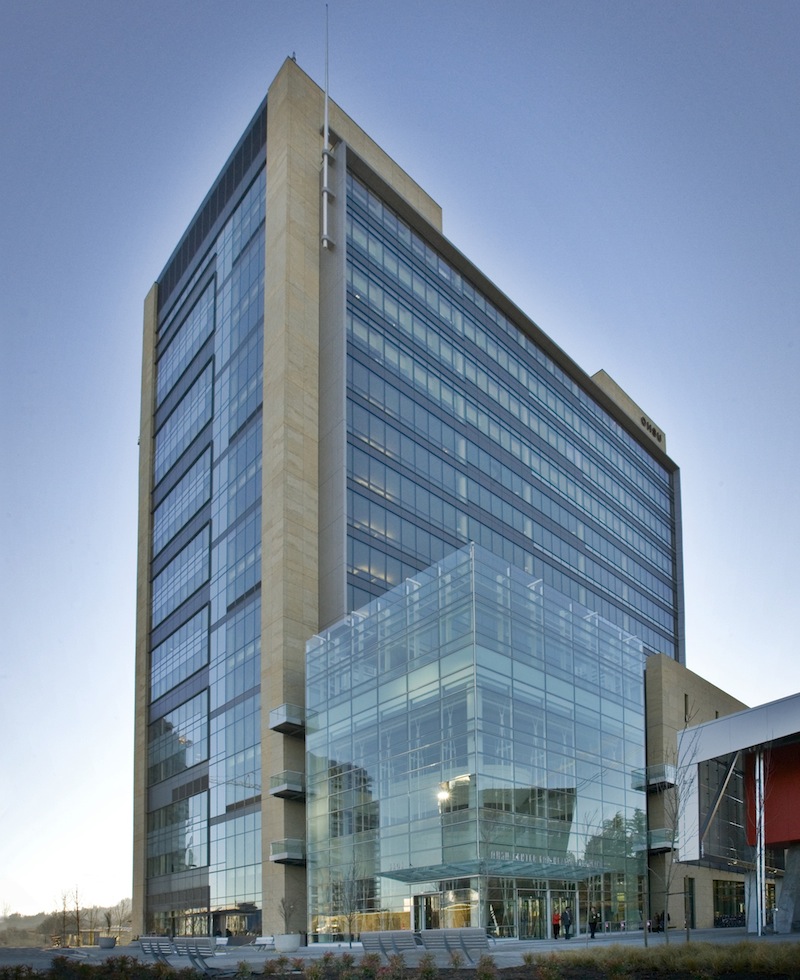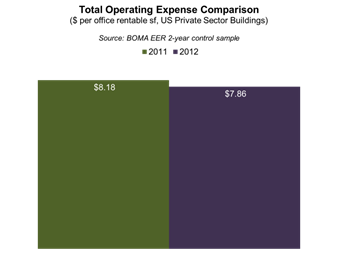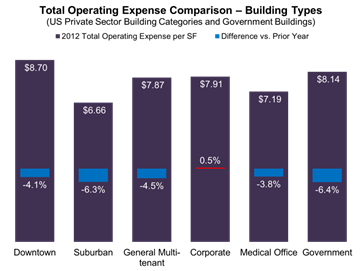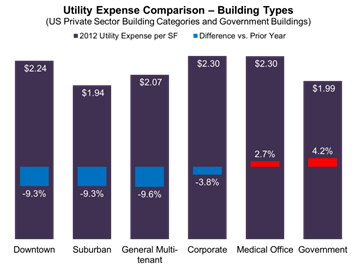According to a study of data from the Building Owners and Managers Association (BOMA) International’s Experience Exchange Report (EER) by Kingsley Associates, the commercial real estate industry’s ongoing focus on energy efficiency has resulted in a downward trend in total operating expenses.
Analysis reveals that properties in the United States reduced total operating expenses from $8.18 to $7.86 per square foot (psf) on average from 2011 to 2012, a difference of $0.32 or 3.9 percent. About two-thirds of these savings were achieved in the utility category, where average expenses fell $0.21—a whopping 9.0 percent—to $2.12 psf, underscoring an industry focus on maximizing building efficiency and smart asset management.
Nearly all building types boasted operating expense savings during 2012. Only corporate facilities saw total operating expenses remain essentially unchanged with a slight 0.5 percent increase. Downtown buildings remained, on average, more expensive to operate than their suburban counterparts, and they also reported a slightly smaller expense savings (4.1 percent versus 6.4 percent for suburban buildings).
As with total operating expenses, the decrease in utility expenses per square foot in 2012 also was broad-based. Private sector office buildings in both downtown and suburban locations observed an identical 9.3 percent reduction, though costs remain higher at downtown locations. Multi-tenanted buildings were able to achieve greater savings than corporate or single-tenanted facilities (9.6 percent versus 3.8 percent), but the trend was the same for both. However, not all property types saw a decline in this area. Utility costs rose 2.7 percent at medical office buildings and 4.2 percent at government-occupied facilities.
In addition to substantial savings on utilities, analysis also revealed that private sector office buildings spent $0.06 (4.0 percent) less per square foot on cleaning in 2012. Cleaning and administrative expenses are essentially tied as the third largest expense categories, behind utilities and repairs/maintenance. Building owners and managers were also able to make modest cuts in security and roads/grounds expenses (a $0.03 decrease in each category), though these categories are small relative to others.
These findings are based on an examination of a specialized control sample of more than 2,000 private sector buildings representing 385 million rentable square feet of U.S. office space that submitted both 2011 and 2012 expense data to the EER database. The sample only includes buildings meeting certain criteria in order to control for the impact of major renovations and changes in occupancy on operating expenses to ensure trends captured are representative of market reality. A complete analysis can be found in the latest issue of The BOMA Magazine.
With detailed income and expense information from more than 5,300 buildings across more than 250 markets, BOMA International’s Experience Exchange Report (EER) is commercial real estate’s premier income and expense benchmarking tool with the largest and most accurate data available in the industry. The EER allows users to conduct multi-year analysis of single markets and select multiple cities to generate state and regional reports. It also offers the capability to search by market, submarket, building size, building type and more for broader analysis. The 2013 Experience Exchange Report is available now at www.bomaeer.com.
About BOMA International
The Building Owners and Managers Association (BOMA) International is a federation of 93 BOMA U.S. associations, BOMA Canada and its 11 regional associations and 13 BOMA international affiliates. Founded in 1907, BOMA represents the owners and managers of all commercial property types, including nearly 10 billion square feet of U.S. office space that supports 3.7 million jobs and contributes $205 billion to the U.S. GDP. Its mission is to advance the interests of the entire commercial real estate industry through advocacy, education, research, standards and information. Find BOMA online at www.boma.org.
About Kingsley Associates
The most successful firms in real estate rely on Kingsley Associates for cutting-edge business intelligence solutions. With a depth and breadth of insight unmatched in the industry, Kingsley Associates brings thought leadership and passionate client service to every engagement. Kingsley Associates is a leader in tenant satisfaction surveys, resident satisfaction surveys, client perception studies, strategic consulting and operations benchmarking. To learn more, please visit our website at www.kingsleyassociates.com or our blog at www.kingsleyinsight.com.
Related Stories
| Aug 11, 2010
Nation's first set of green building model codes and standards announced
The International Code Council (ICC), the American Society of Heating, Refrigerating and Air Conditioning Engineers (ASHRAE), the U.S. Green Building Council (USGBC), and the Illuminating Engineering Society of North America (IES) announce the launch of the International Green Construction Code (IGCC), representing the merger of two national efforts to develop adoptable and enforceable green building codes.
| Aug 11, 2010
More construction firms likely to perform stimulus-funded work in 2010 as funding expands beyond transportation programs
Stimulus funded infrastructure projects are saving and creating more direct construction jobs than initially estimated, according to a new analysis of federal data released today by the Associated General Contractors of America. The analysis also found that more contractors are likely to perform stimulus funded work this year as work starts on many of the non-transportation projects funded in the initial package.
| Aug 11, 2010
Broadway-style theater headed to Kentucky
One of Kentucky's largest performing arts venues should open in 2011—that's when construction is expected to wrap up on Eastern Kentucky University's Business & Technology Center for Performing Arts. The 93,000-sf Broadway-caliber theater will seat 2,000 audience members and have a 60×24-foot stage proscenium and a fly loft.
| Aug 11, 2010
Citizenship building in Texas targets LEED Silver
The Department of Homeland Security's new U.S. Citizenship and Immigration Services facility in Irving, Texas, was designed by 4240 Architecture and developed by JDL Castle Corporation. The focal point of the two-story, 56,000-sf building is the double-height, glass-walled Ceremony Room where new citizens take the oath.
| Aug 11, 2010
Brooklyn's tallest building reaches 514 feet
With the Brooklyner now topped off, the 514-foot-high apartment tower is Brooklyn's tallest building. Designed by New York-based Gerner Kronick + Valcarcel Architects and developed by The Clarett Group, the soaring 51-story tower is constructed of cast-in-place concrete and clad with window walls and decorative metal panels.
| Aug 11, 2010
Carpenters' union helping build its own headquarters
The New England Regional Council of Carpenters headquarters in Dorchester, Mass., is taking shape within a 1940s industrial building. The Building Team of ADD Inc., RDK Engineers, Suffolk Construction, and the carpenters' Joint Apprenticeship Training Committee, is giving the old facility a modern makeover by converting the existing two-story structure into a three-story, 75,000-sf, LEED-certif...
| Aug 11, 2010
Wisconsin becomes the first state to require BIM on public projects
As of July 1, the Wisconsin Division of State Facilities will require all state projects with a total budget of $5 million or more and all new construction with a budget of $2.5 million or more to have their designs begin with a Building Information Model. The new guidelines and standards require A/E services in a design-bid-build project delivery format to use BIM and 3D software from initial ...










